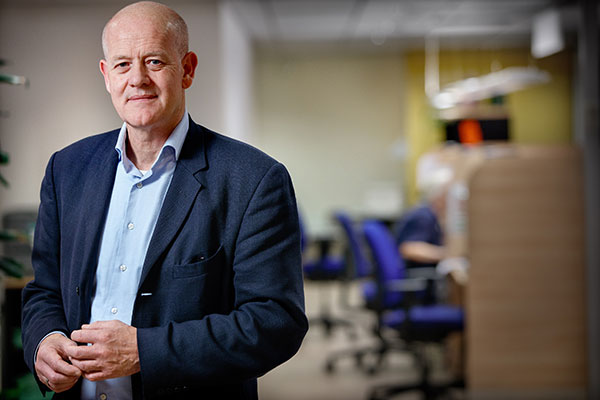
In this episode of ‘Research in the spotlight’, Frank Snoek addresses the issue of increasing engagement with guided self-help programmes among patients and professionals. “The ideal system would be effortless for anyone to use.” Snoek is a professor of Medical Psychology and chair of the departments of two university hospitals in Amsterdam: VU Medical Center Amsterdam and Academic Medical Center.
His overall research focus is on behavioural medicine, addressing the issues of depression and anxiety in people with a chronic somatic disease, and specialised in diabetes. In particular, Snoek is currently working on the development of online guided self-help programmes for persons with diabetes and skin diseases.
Reducing dropout in online programmes
“In my research, we make an effort to implement psychology in medical care – existing cognitive behavioural therapies – and adjust to the specific demands of people with a chronic disease,” he explains. Snoek points out that predominantly self-guided e-therapies have shown to be acceptable and effective, but they do have a downside: dropout rates are high. “We’re working on increasing the flexibility and patient engagement,” he explains, eager to raise the success rate up from a little over half the patients, to hopefully many more recovered patients. Snoek emits a genuine desire to improve people’s quality of life.
“We’re not only researching. There is a clinical purpose for why we do this.”

Research versus implementation
In spite of the current success of ehealth in his home country, Snoek worries sometimes that the advances are limited to the research. “I think e-mental health is quite advanced on a research level, but it is still not broadly implemented, while telemedicine is advancing rapidly.” Yet he expects this to change, due to, firstly, limited resources to fund face-to-face counselling in hospitals and, secondly, pressure from health insurance companies to adopt more e-mental health interventions. “We’ll probably see that the uptake will increase significantly in the coming years,” Snoek predicts.
Resistance among patients and professionals
Uptake means that many more patients will use ehealth. However, Snoek signals resistance from patients. “Not many patients at the moment are interested in ehealth or actively requesting it.” What could be reasons for this? “It’s partly due to the fact that it’s new. People are just not used to it or familiar with it yet and apprehensive it will go at the expense of personal contact with their care provider.” Health care providers themselves are also part of the problem, Snoek thinks. Professionals in health care, particularly primary care physicians, generally don’t see the need to use ehealth technology. “In honesty, they are doing a good job. It’s just they’re not too keen to experience disruption of their routines. But I’m sure we’ll see advancements in the coming years,” he smiles.
The future: ehealth completely integrated in health care
Snoek believes ehealth holds an important place in the future of treating mental health conditions in patients with chronic somatic disease, increasingly building on self-management. He describes a new programme where he has begun working on developing a guided self-help programme for depression in people with diabetes. “This new project combines online treatment with face-to-face contact, where beforehand solely either one or the other was offered. I’m really excited about its possibilities,” he enthuses. This is also now trialled on a group of dermatological patients, where, Snoek is sure, a lot will be learned about how best to design and implement these interventions. Personalisation is key and high on the agenda.
Thinking broadly about the future for patients and professionals, Snoek envisages a future where ehealth and e-mental health are all completely integrated in health care, and where technical hassles are a thing of the past. “The ideal system, whatever that might look like, would be effortless for anyone to use. It would really help professionals to connect with patients and other professionals.” He smiles as he adds: “And there would perhaps be functionalities that we can’t even dream of existing nowadays.”
Want to know more?
The VU Medical Center Amsterdam and Academic Medical Center are part of Minddistrict’s Global Research Network.
Earlier episodes in this blog series:
- Interview with researcher Rocio Herrero on chronic pain and ehealth
- Interview with Ina Beintner on eating disorders.
